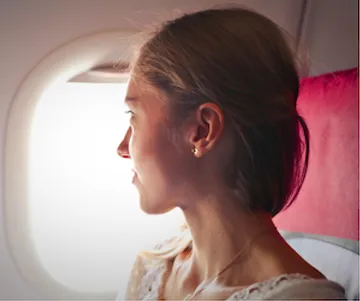The Insider's Guide to Sleeping Well While Traveling
It's easy to miss sleep while traveling, especially over the holidays.
Whether your flight is delayed, you're staying up late to visit with family, or you're flying across multiple time zones, you can end up coming back home completely exhausted.
And then it's right back to work with no time to recover all the sleep you've missed.
Here are some tips to travel well so that you sleep well and come home feeling relaxed and refreshed
Stay Hydrated
It’s very easy to become dehydrated from a day of air travel, both because of the altitude and the recycled air. Because of this, it is important to ensure that you increase your liquid intake about 24–48 hours before departure. Bring a large water bottle of your own to stay hydrated. This will prevent grogginess when you awaken from sleeping on the plane.
Always Avoid the Red-Eye
It may seem like a good idea at the time as you think you’ll sleep and arrive at your destination ready and raring to go, but the reality is usually very different. The seats are not comfortable, your neck gets sore, there is a lot of environmental noise, and you may be tempted to stay up all night watching the in-flight movies.
Plus, being on the plane is only a portion of the travel experience. You have to travel to the airport hours in advance, maybe transfer planes, and wait for your luggage. By the time you arrive at your hotel, you’ll have such a sleep debt that this alone will take you days to recover from.
Travel Prepared
Odd sounds and inconvenient lighting are two of the biggest sleep-robbing culprits in a hotel. There are a few things you should pack to eliminate distractions and make your nights far more comfortable.
It’s worth investing in a decent light-eliminating eye mask: one that you’ve practiced using for at least a week before your flight so you are comfortable sleeping with it on. Or travel with black electrical tape and a small pair of scissors. Once you’ve turned out the lights for the night, you can block out any and all other small things that emit light, like the phone or the TV.
To prevent noise interruptions, bring along some earplugs. Or, if noise is a huge issue for you, consider investing in a portable white noise machine to block out unwelcome sounds.
Avoid Alcohol and Caffeine
It can be tempting to have a couple of glasses of wine on the flight, but just remember to cut out the alcohol at least two hours before you want to go to bed, or it will interfere with the quality of your sleep.
Likewise, try not to guzzle large amounts of caffeine to stay awake. This, too, will make it harder for you to fall asleep when you are ready for bed. Most people need at least four to six hours to metabolize caffeine, so keep that in mind when you are thinking about your ideal bedtime when you arrive.
Time Your Meals
Food is another thing to consider while traveling. Eating a big meal too close to when you want to fall asleep will impact your night. Try to shoot for no food at least 2 hours before you want to sleep.
Chamomile tea right before bed can be an effective sleep aid, and the scent of lavender is a natural sleep enhancer. Try carrying a lavender candle, a scented facemask, or some essential oil.
Pick a Quiet Room
Some parts of the hotel can be quieter than others. For a good night's sleep, try requesting a room on a higher floor, away from the elevators. This should help block out street noise and foot traffic. And don’t forget to put out the “Do Not Disturb” sign!
Stick to your Bedtime Routine
The excitement of travel can leave your mind buzzing when it’s time to go to sleep. So it's important to stick to your bedtime routine as closely as you possibly can while you travel. Your body and brain are deeply in tune with this cueing system, so it will help calm down and signal the body that nighttime sleep is near.
Naps
Short naps during the day can be helpful in paying back some of the sleep debt acquired for the travel day or poor sleep at night. Try to keep these naps in the early afternoon so they don’t impact the sleep pressure needed before bed.
It’s also wise to keep them to about 30 minutes. This will rejuvenate you but won’t let you slide into deep sleep, which will actually make you feel worse if you wake up during it.
I hope these tips help you get the sleep you need to enjoy your vacation to the fullest!
Ready to get 7+ hours of uninterrupted sleep consistently? Book a Consultation for the Complete Sleep Solution Program.
As always, if you struggle to sleep well, don't hesitate to get in touch with The Sleep Detective™! You can book a free call here to talk about possible sleep solutions that are right for you.

